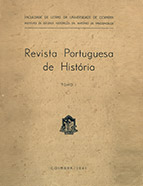

................................
As for the organisation of the journal, Articles were planned in which "issues" of "direct or indirect" interest to the History of Portugal "in its different aspects" would be dealt with, and various sections: the Miscellany "consisting of brief notes, comments, etc., which may in some way contribute to clarifying any aspect of our History"; Foreign Historiography dedicated to the dissemination of "the most important works published in various countries on political and ecclesiastical history, economic and social history, law and institutions, (in the 2nd tome the name changed to National and foreign historiography with the addition of reviews of works on Sources and Auxiliary Sciences of History and History of Thought); Bibliography a part dedicated to the appreciation of "works that truly represent new contributions to the knowledge of our History" and of whose appearance it was informed and, finally, the Miscellaneous where "the most important events regarding national and foreign historiography and, in particular, the activity of our Institute" would be recorded.
From the text transcribed above, we emphasise the fact that the main aim of the RPH was to disseminate the results of historical research into the History of Portugal, carried out by the members of the Institute of Historical Studies, and that it could also publish texts by other historians who wanted to work "in harmony with its methods of historical research and criticism". Research methodology and historical construction were therefore the only criteria for inclusion or exclusion of articles. Open to the wider world, the RPH aimed to "chart new directions for national historiography", a goal pursued through the inclusion of reviews of foreign historiography. The editors of the RPH diligently adhered to this goal in the first issues. In fact, the first tome published 100 pages dedicated to foreign historiographical production from 1939, authored by a number of prominent foreign historians: Pedro Calmon (Brazil), R. Prieto Bances (Spain), José Torre Revello (Argentina), Augustin Fliche (France), Charles Verlinden (Belgium and The Netherlands), and Mario Viora (Italy). English historiography was organised thematically: A. Taylor Milne (General and Political History), Artur Redford (Economic and Social History), Marjorie Blatcher (History of Law and Institutions). Finally, Eugen Wohlhaupter wrote about "legal folklore" in Germany. In tome II, published in 1943, Prieto Bances (Spain), Augustin Fliche (France), and Charles Verlinden (Belgium and Holland) continued to collaborate with reviews of historiographical production from 1940-1941. In the same section, Portuguese historians collaborated to analyse the historiographical production of 1939-41 in the following fields: João Franco Machado (History of the Discoveries), Magalhães Vilhena (History of Thought), and Braga da Cruz (History of Law and Institutions). Torquato de Sousa Soares wrote about a dozen books.
This work is financed by national funds through FCT - Foundation for Science and Technology, I.P, in the scope of the projects UIDB/04311/2020 and UIDP/04311/2020.
